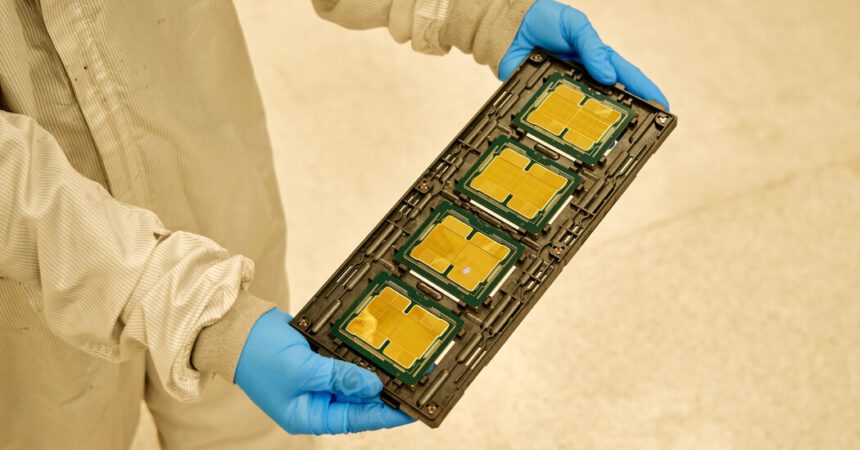The Biden administration on Tuesday announced additional limits on sales of advanced semiconductors by American firms, shoring up restrictions issued last October to limit China’s progress on supercomputing and artificial intelligence.
The rules appear likely to halt most shipments of advanced semiconductors from the United States to Chinese data centers, which use them to produce models capable of artificial intelligence. More U.S. companies seeking to sell China advanced chips, or the machinery used to make them, will be required to notify the government of their plans, or obtain a special license.
To prevent the risk that advanced U.S. chips travel to China through third countries, the United States will also require chip makers to obtain licenses to ship to dozens of other countries that are subject to U.S. arms embargoes.
The Biden administration argues that China’s access to such advanced technology is dangerous because it could aid the country’s military in tasks like guiding hypersonic missiles, setting up advanced surveillance systems or cracking top-secret U.S. codes. Leading A.I. experts have warned that the technology, if not properly managed, could pose existential threats to humanity.
But artificial intelligence also has valuable commercial applications, and the tougher restrictions may affect Chinese companies that have been trying to develop A.I. chatbots like ByteDance, the parent company of TikTok, or the internet giant Baidu, industry analysts said. In the longer run, the limits could also weaken China’s economy, given that A.I. is transforming industries ranging from retail to health care.
The limits also appear likely to affect sales to China of U.S. chip makers such as Nvidia, AMD and Intel. Some chip makers earn as much as a third of their revenue from Chinese buyers and spent recent months lobbying against tighter restrictions.
U.S. officials said the rules would exempt chips that were purely for use in commercial applications, like smartphones, laptops, electric vehicles and gaming systems. Most of the rules will take effect in 30 days, though some will be effective sooner.
In a statement, the Semiconductor Industry Association, which represents major chip makers, said it was evaluating the impact of the updated rules.
“We recognize the need to protect national security and believe maintaining a healthy U.S. semiconductor industry is an essential component to achieving that goal,” the group said. “Overly broad, unilateral controls risk harming the U.S. semiconductor ecosystem without advancing national security as they encourage overseas customers to look elsewhere.”
A spokesperson for Nvidia said that the company complied with all applicable regulations and that it did not expect a meaningful near-term effect on its financial results, given worldwide demand for Nvidia’s products.
In a call with reporters on Monday, a senior administration official said that the United States had seen people try to work around the earlier rules, and that recent breakthroughs in generative A.I. had given regulators more insight into how the so-called large language models behind it were being developed and used.
Gina M. Raimondo, the secretary of commerce, said the changes had been made “to ensure that these rules are as effective as possible” and that she expected the rules to be updated at least annually as technology advanced.
Referring to the People’s Republic of China, she said, “The goal is the same goal that it’s always been, which is to limit P.R.C. access to advanced semiconductors that could fuel breakthroughs in artificial intelligence and sophisticated computers that are critical to P.R.C. military applications.”
She added, “Controlling technology is more important than ever as it relates to national security.”
The tougher rules could anger Chinese officials when the Biden administration is trying to improve relations and prepare for a potential meeting between President Biden and China’s top leader, Xi Jinping, in California next month.
The Biden administration has been trying to counter China’s growing mastery of many cutting-edge technologies by pumping money into new chip factories in the United States. It has simultaneously been trying to set tough but narrow restrictions on exports of technology to China that could have military uses, while allowing other trade to flow freely. U.S. officials describe the strategy as protecting American technology with “a small yard and high fence.”
But determining which technologies really pose a threat to national security has been a contentious task. Major semiconductor companies have argued that overly restrictive trade bans can sap them of the revenue they need to invest in new plants and research facilities in the United States.
Some critics say the limits could also fuel China’s efforts to develop alternative technologies, ultimately weakening U.S. influence globally. Chinese researchers have made significant progress in developing domestic versions of advanced chips, but experts say the country remains years behind Western capabilities.
The changes announced Tuesday appear to have particularly significant implications for Nvidia, the biggest beneficiary of the artificial intelligence boom.
In response to the Biden administration’s first major restrictions on artificial intelligence chips a year ago, Nvidia designed new chips, the A800 and H800, for the Chinese market that worked at slower speeds but could still be used by Chinese firms to train A.I. models. A senior administration official said the new rules would restrict those sales.
Nvidia has said that China typically generates 20 percent to 25 percent of the company’s data center revenue, which includes other products in addition to chips that enable A.I. Analysts said that growing global demand for Nvidia chips for use in A.I. might allow the company to offset those losses by selling to other markets instead. But concerns about the impact of new performance limits on a wider set of Nvidia chips caused its stock price to fall more than 3 percent Tuesday.
The administration also placed two Chinese chip design companies and their subsidiaries — units of Moore Threads Technology and Biren Technology — on an “entity list” that requires U.S. companies to receive special permission before they can ship materials to them.
The United States also said it would create a new “gray list” that requires makers of certain less advanced chips to notify the government if they are selling them to China, Iran or other countries subject to a U.S. arms embargo.
“What strikes me is the significant expansion of countries to which exports will now require a license,” said Emily Benson, an analyst at the Center for Strategic and International Studies, a Washington think tank.
The rules did not appear to limit Chinese firms’ access to foreign cloud services run by Amazon and Microsoft. The administration had considered clamping down on that business in recent months because Chinese firms had used such services as a kind of backdoor to access advanced artificial intelligence chips outside of China. But Ms. Benson said such a measure could come later in the form of an executive order.
In a note to clients last week, Julian Evans-Pritchard, the head of China economics at the research firm Capital Economics, said the effects of the controls would become more apparent as non-Chinese companies rolled out more advanced versions of their current products.
“The upshot is that China’s ability to reach the technological frontier in the development of large-scale A.I. models will be hampered by U.S. export controls,” Mr. Evans-Pritchard wrote. That could have broader implications for the Chinese economy, he added, since “we think A.I. has the potential to be a game changer for productivity growth over the next couple decades.”
Don Clark contributed reporting.










